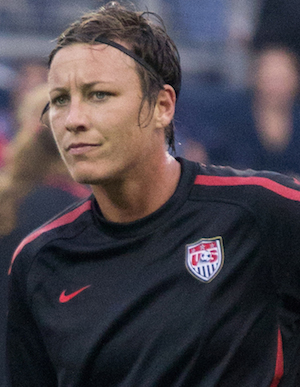Women don’t have it equal when it comes to sports. This is an enormous topic and one that can’t be addressed in a single post. One small piece of gender inequality has been bothering me lately, in part because it’s something I’ve been doing on this website. It’s about how and when I use pronouns to label sporting events. I, like so many other writers, have a tendency to use a gender pronoun only when discussing women’s sports. We’ll write about the “Women’s World Cup” but when it’s time for the men to play, we just write, “World Cup.” This may seem like a small thing, but it has far reaching implications. By making male the default gender of sports, we make it easy to people to simply forget that women’s sports exists. Valerie Alexander wrote a wonderful essay about this topic in which she points out that although people frequently refer to Landon Donovan as the United States’ all-time international scoring leader, he’s not. He’s actually not even in the top five, all of whom are women. Abby Wambach, the veteran leader of the United States Women’s National team is actually the all-time world leader with 177 goals. That’s a 100 more than Pele! Allowing male to be the default gender in sports becomes a vicious cycle with real material consequences. Just this week, Allison McCann wrote a response to sports stats guru Nate Silver‘s claim that “Sports has awesome data.” McCann responds by saying that Silver left off a word in his claim — “men’s sports has awesome data,” not women’s sports. The pronoun makes all the difference. When applied to talking about a romantic partner, the pronoun game is something people do to obscure the gender of their partner. In sports, the pronoun game is an evil little careless thing we do that helps make sports an uneven ground for women to participate in. Today, I’m pledging to do my best to stop playing that game on this website.
Every week-day morning I post a sports forecast. The forecast consists of a two to three-minute podcast in which I quickly run through the best and highest profile sporting events of the day, where they are being televised, who the interesting characters are, or what the plot of the games might be. To go along with this, I post just the most basic information about the games I cover in the podcast, as text in the sports forecast post. These lines follow a predictable pattern:
- Sport – Away Team at Home Team, Time on TV Channel.
To use an example from today’s forecast:
- NBA Basketball – Miami Heat at New Orleans Pelicans, 8 p.m. ET on ESPN.
Although male sporting events dominate the sports landscape from a popularity perspective I try to mix in some women’s sports whenever I can. This isn’t just an idle gesture towards gender equality, I love watching women’s sports. When I went to the Olympics last year, all the events I saw except for a single day at the Men’s Ice Hockey rink were women’s events. I care at least as much (probably more) about the U.S. Women’s National Soccer Team as I do about the men’s team. So, as much as I can, I try to track at least the higher profile women’s sports — college basketball and international soccer — and put them into my sports forecasts.
The problem is — that I don’t know exactly how to list them. When I list a men’s college basketball game or a men’s international soccer game, I don’t list the gender, I just write:
- College Basketball – Princeton at Rutgers, 7 p.m. ET on ESPN7.
So, when I feature a women’s college basketball game, what should I do? It doesn’t feel quite right to write “Women’s college basketball” because then I’m making male the default gender and women an aberration. It’s true, that in mainstream coverage of college basketball, this is actually the truth about the position of the two genders. For evidence, you needn’t go farther than Sports Illustrated’s front page which lists men’s college basketball as NCAAB (NCAA Basketball) and women’s college basketball as NCAAW (NCAA Women?!). ESPN’s front page at least uses NCAAM and NCAAW as its two abbreviations but hides the women’s coverage in a “see more” style drop-down.
To date, I’ve experimented with simply leaving the gender off the page and only mentioning it in the podcast itself. Who cares if it’s men or women playing? It’s college basketball. If you like college basketball, you should watch it regardless of gender. I’m not so sure about that though — it seems almost willfully confusing, which goes against this site’s mission of making sports more accessible and easily understood. So, from now on, I’ll try to list the gender for all sporting events where the gender is not clear from the league’s name. College basketball and international soccer will get their gender pronouns whenever I write about them. Professional leagues like the NFL, NBA, NHL, MLB, MLS, EPL, and so on, will not get genders because only men (with a few notable exceptions) play in those leagues.
It’s a tiny little thing but every little bit helps. Thanks for reading and please call me out when I slip into defaulting to male in my writing about sports!

